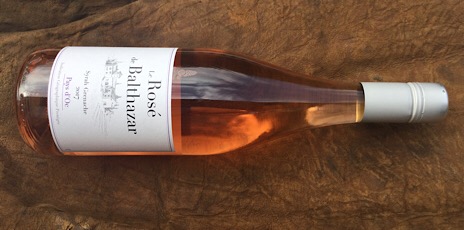
Henri was standing at the side of the road hitching a lift. Like me, he was heading for the neighbouring town of Pont L’Abbé; in all, the drive would take about ten minutes. These days I rarely give lifts to strangers but the sky was leaden, the forecast was for rain and he was alone; my decision was almost reflex. I still occasionally hitch-hike myself and, if I get a ride, I am always grateful.
Henri walked hesitantly to the car and climbed in – that is an exaggeration, he flopped in. Attaching his seat belt was clearly difficult and it was soon obvious that he needed help – he had a problem using his left arm. As I leant over to fasten the belt a strong smell of alcohol wafted past and, when he spoke, his voice was slightly slurred. It was mid-morning and I had just picked up a passenger who was drunk. From the corner of my eye I noticed more – the fingers of his left hand were held cupped, the hand itself was cocked forward and, from the contour of his left coat sleeve, his left forearm was swollen. Something was clearly very wrong!
After he had introduced himself he told me how he was going to meet a friend for a drink. He hitch–hiked everywhere and, as usual, he had been lucky – he had only been waiting for about five minutes. Conversation with him was easy. He spoke slowly and carefully, his sentences were short and reasoned, and, most importantly, I understood what he had in mind.
Henri seemed open and honest. I learned that by lunchtime most days he would be drunk and in the afternoon he would go back to his aunt’s house to sleep off the morning’s effects. He was in his forties, had been drinking heavily for most of his adult life and, after experiencing a wide range of alcoholic beverages, now limited himself to beer and vin rosé. Both served his purpose and, if he shopped carefully, both cost much the same.
While we talked my medical mind was whirring as I tried to make sense of his symptoms. I pieced together a scenario that seemed to fit. He was, I decided, born with a form of cerebral palsy that primarily affected his left upper limb. Such damage would account for the weakness of his left arm and his ‘contracted’ wrist and fingers. The brain damage, I supposed, also caused learning difficulties which had contributed to his slowed talking and would have made it hard for him to find employment in later life; often, unemployment and alcoholism go hand-in-hand.
So far, almost everything made medical sense. However, I was unable to account for the swelling of his weak arm. The type of paralysis I envisaged had no such effect on arm size. I assumed therefore that the swelling was the result of a recent incident; possibly a fall or a brawl during a drinking episode.
We were getting on well and, as we neared Pont L’Abbé, I felt I could ask him what had happened to his arm. His initial response confirmed at least some of my thinking – “It’s the bottle” he replied. Assuming this meant that his problems were caused by alcohol, I sought further clarification. Pointing to his sleeve I asked him exactly how his arm had become so very swollen.
He smiled broadly, loosened his cuff, straightened his wrist, uncupped his ‘restraining’ fingers and, from out of his sleeve, pulled an unopened bottle of his favourite vin rosé. In seconds the cause of his swelling and his reluctance to use his left hand – were resolved! I mentioned to him that I had thought that the swelling was caused by some serious damage. “It was – the bottle is indeed a very damaging affliction”. Soon we said our goodbyes as I dropped him off for his rendezvous.
In all this I had been caught in a medical trap of my own creation. Piecing together symptoms is something doctors do and I am no exception. In our training we are programmed to observe, assess, integrate and account for, symptoms; if we get the diagnosis right we feel satisfied. We are also trained to ask questions, which, of course, is what I did.
In all this, our judgements are most often the product of a medicalised world. My ‘invention’ of Henri’s cerebral palsy and his learning difficulties were the product of my doctor’s mind-set. The possibility that someone drunk might hide a bottle of wine up his sleeve never entered my mind.
Despite it being over eleven years since my retirement from medicine, my thinking is still dominated by doctor thought. In important ways my training of yesteryear can sometimes prove very limiting.
Dear Joe,
I very much enjoyed this post and laughed out loud when your diagnosis was upended! Sad though- a man in his forties in his position.
Love
Robin
LikeLike
Dear Robin, Henri’s position was indeed very sad but he is accepted, even liked, in his community and that find very reassuring. Joe
LikeLike
Good story Joe – need to be careful who you pickup! Hope you both enjoying the summer. We off on cruise next Saturday – to Greenland visiting all Islands on way. Love C and M
Sent from my iPad
LikeLike
Haha, the picture of that lovely bottle of rose, made me think immediately that was being stashed in his sleeve… nice to know our early assessment of a situation can be right! And who knows Joe, your medical skills will no doubt help in the future as they have done so, so many times in the past.
LikeLike
Dear Carolyn, As in so many ways you are smarter than me. As I say in the blog – my medical mind never twigged. But as everyone knows, we doctors are often narrow-minded! Love, Joe
LikeLike